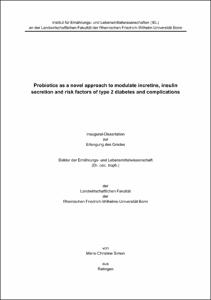Probiotics as a novel approach to modulate incretins, insulin secretion and risk factors of type 2 diabetes and complications

Probiotics as a novel approach to modulate incretins, insulin secretion and risk factors of type 2 diabetes and complications

| dc.contributor.advisor | Stehle, Peter | |
| dc.contributor.author | Simon, Marie-Christine | |
| dc.date.accessioned | 2020-04-19T07:45:27Z | |
| dc.date.available | 2020-04-19T07:45:27Z | |
| dc.date.issued | 10.01.2014 | |
| dc.identifier.uri | https://hdl.handle.net/20.500.11811/5819 | |
| dc.description.abstract | Background and Aim: Ingestion of probiotics can modify gut microbiota and alter insulin resistance and diabetes development in rodents. We hypothesized that daily intake of Lactobacillus (L.) reuteri increases insulin sensitivity by changing cytokine release and insulin secretion via modulation of glucagon-like peptide (GLP-1, GLP-2) release. Material and Methods: A prospective, double-blind, randomized trial was performed in 21 glucose tolerant humans (10 obese; age 51±2 years, BMI 36.0±4.8 kg/m2; 11 lean; 49±4 years, BMI 23.6±1.9 kg/m2). Participants ingested 1010 L. reuteri or placebo b.i.d. over 4 weeks. Oral glucose tolerance and isoglycemic glucose infusion tests were used to assess GLP-1, GLP-2 and C-peptide secretion, hyperinsulinemic-euglycemic clamps with [6,6-2H2]glucose to measure peripheral insulin sensitivity (M-value) and endogenous glucose production (EGP). Muscle and hepatic lipid contents were measured by 1H magnetic resonance spectroscopy. Immune status was assessed by measuring systemic cytokines, high-sensitive C-reactive protein (hsCRP) and lipopolysaccharide (LPS) concentrations. Results: Intervention did not affect body mass, ectopic fat content and circulating cytokines. M was 37% lower (p<0.01) in obese than in lean volunteers, but both M-value and EGP did not change upon L. reuteri treatment. However, administration of L. reuteri increased glucose-stimulated insulin and C-peptide secretion by 49% (p<0.05) and 55% (p<0.05), respectively. Moreover, administration of L. reuteri improved the glucose-stimulated GLP-1 and GLP-2 release by 76% and 43%, respectively, compared to placebo (p<0.05). Conclusions: Enrichment of gut microbiota with L. reuteri increased incretin-mediated insulin and C-peptide release, without effects on insulin sensitivity in glucose tolerant human subjects. These results suggest that modifying the microbiome could increase insulin secretion and thereby serve as a novel therapeutic tool for the treatment of type 2 diabetes. However, further studies are needed to address this issue in this emerging research field. | |
| dc.language.iso | eng | |
| dc.rights | In Copyright | |
| dc.rights.uri | http://rightsstatements.org/vocab/InC/1.0/ | |
| dc.subject | Probiotika | |
| dc.subject | GLP-1 | |
| dc.subject | GLP-2 | |
| dc.subject | Inkretine | |
| dc.subject | Darm | |
| dc.subject | Metabolismus | |
| dc.subject.ddc | 630 Landwirtschaft, Veterinärmedizin | |
| dc.title | Probiotics as a novel approach to modulate incretins, insulin secretion and risk factors of type 2 diabetes and complications | |
| dc.type | Dissertation oder Habilitation | |
| dc.publisher.name | Universitäts- und Landesbibliothek Bonn | |
| dc.publisher.location | Bonn | |
| dc.rights.accessRights | openAccess | |
| dc.identifier.urn | https://nbn-resolving.org/urn:nbn:de:hbz:5n-34643 | |
| ulbbn.pubtype | Erstveröffentlichung | |
| ulbbnediss.affiliation.name | Rheinische Friedrich-Wilhelms-Universität Bonn | |
| ulbbnediss.affiliation.location | Bonn | |
| ulbbnediss.thesis.level | Dissertation | |
| ulbbnediss.dissID | 3464 | |
| ulbbnediss.date.accepted | 13.12.2013 | |
| ulbbnediss.fakultaet | Landwirtschaftliche Fakultät | |
| dc.contributor.coReferee | Schloot, Nanette Cathrin |
Files in this item
This item appears in the following Collection(s)
-
E-Dissertationen (1022)




